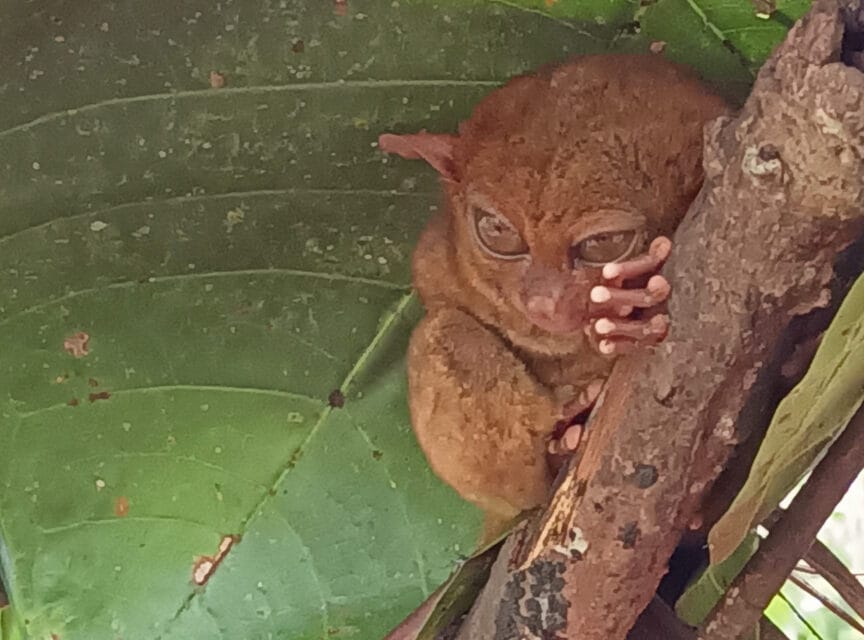DENR warns against harming tarsiers, other wildlife

Source: MindaNews
KORONADAL CITY (MindaNews / 12 April) - Authorities here issued a stern warning against harming wildlife after criminal cases were filed against two persons, who uploaded a video showing them playing with two tarsiers they caught in Polomolok, South Cotabato.
The two, Ryan Parreño at Sammy Estrebilla, were allegedly the vloggers behind the now deleted Farm Boy Facebook page. Their video went viral on social media and angered netizens.
Lawyer Felix Alicer, regional executive director of the Department of Environment and Natural Resources (DENR) in the Soccsksargen region, said their investigation of the incident led to the filing of criminal charges against the two on Thursday, April 11.
Alicer said the two were criminally liable for violating Section 27 of Republic Act 9147 or Wildlife Act of 2001 and Section 20 of Republic Act 9786, as amended by RA 11038 or the Expanded National Integrated Protected Areas System (E-NIPAS) Act of 2018.
The penalty includes hefty fines and years of imprisonment, the DENR official said.
Alicer said the criminal case was meant to send a strong message to the public that "wildlife are not playthings and must not be kept as pets."
The law has corresponding stiff penalties to anyone who harms wildlife, the official pointed out.
Tarsier, categorized as "other threatened species" in DENR Administrative Order 2019-09 or the updated national list of threatened Philippine fauna and their categories, can be found in many areas in the Soccsksargen region, particularly in the provinces of Sarangani, South Cotabato, Cotabato and Sultan Kudarat.
On March 6, authorities released back into the wild a 10-gram tarsier that fell from a tree in barangay Kimarayag, Pigcawayan town, Cotabato.
Pigcawayan Municipal Environment Officer Joaquin Tacula said the tarsier was rescued by militia member Francisco Nemenzo, who saw the tiny animal being chased by a dog.
Tacula said tarsiers are not to be kept as pets as they can easily get stressed when improperly handled. There is even a law that prohibits its possession by anyone without the necessary permission by the government, he added.
Not a primate
Referred to by some as the world's smallest monkey, tarsier (Tarsius syrichta) is neither a monkey nor a small primate. Experts said it belongs to a category that is between lemurs and monkeys in the evolutionary scale.
Tarsiers, which normally measure four to six inches, have large eyes with a head that can rotate 180 degrees. Its large, membranous ears are always moving. It has thick and silky gray to dark brown fur.
Tarsiers are usually seen clinging on tree branches and can leap from trunk to trunk, using their elongated limbs. The small animal preys mainly on insects for food.
Tarsier is known to thrive in the rainforests of the East Indies, from the island of Sumatra to Sulawesi and the Philippines. Considered endemic in the Philippines, it has three recognized subspecies T.s syrichta in Leyte and Samar, T.s fraterculus in Bohol, and T.s. carbonarius in Mindanao.
Tarsier's known habitat is among tall grasses, bushes and small trees. They move by leaping from tree to tree.
Proclamation 1030
The tarsier was declared as "a specially protected faunal species of the Philippines" in Proclamation no. 1030 signed by President Fidel Ramos on June 23, 1997.
The proclamation reads, "The preservation of the Philippine tarsier is a matter of national concern since it forms part of the Philippine heritage."
The Proclamation states that tarsier is "vanishing due to unabated destructive activities within its known habitats."
It further says that "hunting, killing, wounding, taking away, possession of the Philippine tarsier and the conduct of activities destructive of its habitats" are prohibited."
Habitat loss
Elizabeth Ramos, chairperson of the Maitum Advocates for Sustainable Environment (MASE) in Sarangani province, said incidence of tarsiers being caught and rescued has become frequent in recent months.
This is because of habitat loss with the continued degradation of forests, where these tiny creatures thrive, she said.
Maitum, the town where Ramos lives, is known to have many tarsiers.
"There is now continuous destruction of their habitat due to logging and mining," she said.
Authorities need to be more decisive in their actions in protecting nature and the environment, "lest we see the last of these threatened and vulnerable species," she said. (Rommel G. Rebollido/MindaNews)
